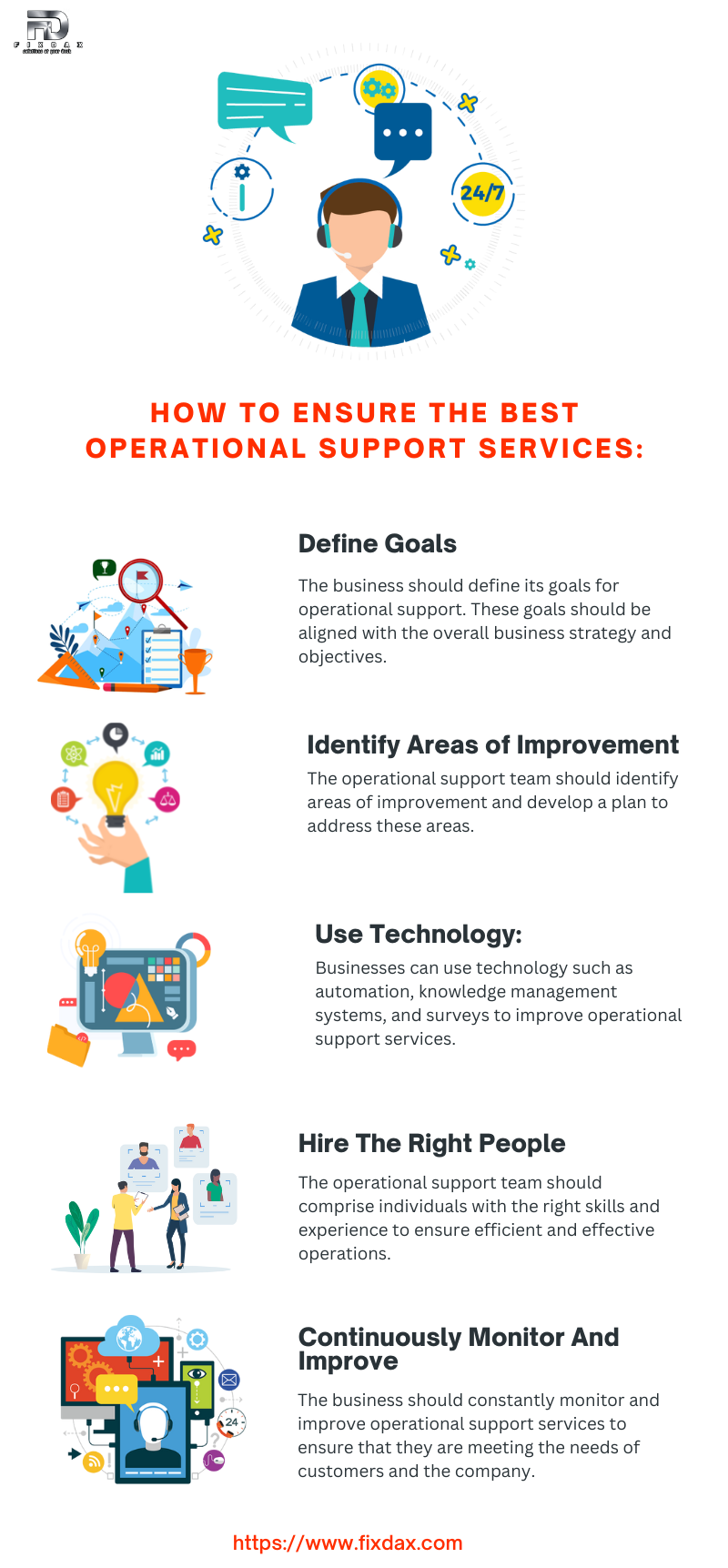Introduction:
Customer support is the backbone of any business, and providing top-notch support to customers is crucial for success. Likewise, operational support is vital in ensuring customers are satisfied, and the business runs smoothly. Operational support encompasses a range of activities and processes designed to improve the customer experience and ensure the efficient running of business operations.
This blog will discuss the meaning of operational support, the roles and responsibilities of an operational support team, the advantages of business operations support, how to ensure the best operational support services, and the tools used in business operations support.
What Is The Meaning of Operational Support?
Operational support is a critical component of any business that focuses on ensuring that the business’s day-to-day operations run smoothly and efficiently. It encompasses a broad range of activities and functions designed to support the business’s core operations, from providing customer support to managing systems and infrastructure.
At its core, operational support is all about ensuring that the business can operate effectively and efficiently without interruptions or delays. It involves ensuring that systems are running smoothly, that employees have the tools and resources they need to do their jobs effectively, and that customers receive the support they need to be satisfied with the business’s products or services.
Operational support can take many forms, depending on the business’s specific needs. For example, it may involve managing a help desk to provide customer support services, monitoring and maintaining critical systems and infrastructure, or providing training and development to employees to ensure they have the skills they need to perform their jobs effectively.
Overall, the goal of operational support is to ensure that the business can operate effectively and efficiently, with minimal downtime, errors, or other disruptions. As a result, companies can improve customer satisfaction, increase efficiency, and gain a competitive advantage in the marketplace by providing high-quality operational support services.
What Are The Roles And Responsibilities Of the Operational Support Team?
The operational support team is responsible for ensuring that a business’s operations run smoothly and efficiently. The team’s roles and responsibilities can vary depending on the size of the company and the specific operational needs. However, some typical roles and responsibilities of an operational support team include the following:

- Customer Support: The operational support team is responsible for providing customer support services. It can include responding to customer inquiries, resolving customer complaints, and ensuring customer satisfaction.
- Incident Management: The operational support team manages incidents that can impact the business’s operations. It can include system outages, network failures, and other issues impacting the business’s ability to operate.
- System Maintenance: The operational support team is responsible for maintaining the systems and infrastructure that are critical to the business’s operations. It can include performing routine maintenance, installing updates and patches, and troubleshooting issues.
- Process Improvement: The operational support team is responsible for identifying areas for improvement and implementing changes to improve efficiency and effectiveness. It can involve analyzing business processes, identifying bottlenecks, and implementing solutions to streamline operations.
- Training and Development: The operational support team trains and develops employees on operational processes and procedures. It can include training on new systems, updating training materials, and ensuring employees have the necessary skills to perform their jobs effectively.
- Security Management: The operational support team is accountable for ensuring the security of the business’s systems and data. It can include implementing security measures such as firewalls, antivirus software, and encryption, monitoring security breaches, and responding to security incidents.
- Performance Monitoring: The operational support team has the role of monitoring the performance of the business’s systems and infrastructure. It can include tracking system uptime, response times, and other performance metrics to ensure systems operate at peak efficiency.
Advantages Of Business Operations Support:
Business operations support provides several advantages to businesses. Some of the key benefits of business operations support include the following:
- Improved Customer Experience: Operational support plays a critical role in improving the customer experience. Businesses can improve customer satisfaction and loyalty by providing timely and practical support.
- Increased Efficiency: Operational support can help businesses improve their efficiency and productivity by streamlining processes, reducing downtime, and minimizing errors.
- Competitive Advantage: Businesses that provide high-quality operational support services can gain a competitive advantage. By providing better service, businesses can differentiate themselves in the marketplace and attract more customers.
- Better Decision Making: Business operational support can provide the data and insights they need to make informed decisions. By analyzing operational data, businesses can identify areas for improvement and make data-driven decisions.
- Cost Savings: Operational support can help businesses save costs by reducing downtime, minimizing errors, and improving efficiency. By optimizing operations, companies can reduce the cost of operations and improve profitability.
- Increased Flexibility: Operational support can help businesses become more flexible and adaptable to changing business needs. By optimizing processes and systems, companies can more easily adjust to changes in the marketplace and respond to new challenges.
- Improved Collaboration: Operational support can facilitate collaboration between different departments and teams within a business. By providing a central hub for operational data and processes, operational support teams can help teams work together more effectively and efficiently.
In summary, operational support plays a vital role in ensuring that businesses run smoothly and efficiently. By providing practical customer support, incident management, system maintenance, process improvement, and training and development, operational support teams can contribute to the success of any business.
Additionally, businesses can leverage tools such as knowledge management systems, automation, surveys, data analytics, and project management tools to optimize their operational support services and gain a competitive advantage.
How To Ensure The Best Operational Support Services:
Businesses must focus on several key areas to ensure the best operational support services. These include optimizing processes and systems, building a skilled and dedicated team, and leveraging technology to automate and streamline workflows.
Optimizing processes and systems is one of the first steps in ensuring the best operational support services. It involves reviewing existing processes and identifying areas for improvement, such as streamlining workflows or reducing redundant tasks. By optimizing processes, businesses can improve efficiency and reduce errors, leading to increased customer satisfaction and a better overall customer experience. Other tips for building and scaling efficient operational support include the following:

- Define Goals: The business should define its goals for operational support. These goals should be aligned with the overall business strategy and objectives.
- Identify Areas of Improvement: The operational support team should identify areas of improvement and develop a plan to address these areas.
- Use Technology: Businesses can use technology such as automation, knowledge management systems, and surveys to improve operational support services.
- Hire The Right People: The operational support team should comprise individuals with the right skills and experience to ensure efficient and effective operations.
- Continuously Monitor And Improve: The business should constantly monitor and improve operational support services to ensure that they are meeting the needs of customers and the company.
Ultimately, ensuring the best operational support services requires a combination of process optimization, skilled employees, and technology. Businesses can improve efficiency, reduce errors, and provide a better overall customer experience by focusing on these areas.
Tools Used In Business Operations Support:
To provide effective business operational support, enterprises can use a variety of tools. Some of the most common tools used in business operations support are:
- Knowledge Management System: A knowledge management system is a software tool that helps businesses capture, organize, and share information. It provides a centralized location for storing and sharing knowledge, which employees can access to improve operational support services.
- Automation: Automation involves using software tools to automate repetitive and time-consuming tasks. It can include tasks such as data entry, scheduling, and reporting. By automating these tasks, businesses can free up employees to focus on more complex and higher-value activities.
- Surveys: Surveys are a valuable tool for gathering feedback from customers and employees. Businesses can use surveys to gather input on operational support services, identify areas for improvement, and track progress over time.
- Data Analytics: Data analytics involves using software tools to analyze large amounts of data to identify trends and patterns. Businesses can use data analytics to identify areas for improvement, optimize business processes, and make data-driven decisions.
- Project Management Tools: Project management tools manage projects, tasks, and workflows. They provide a centralized location for tracking progress, managing tasks, and collaborating with team members. In addition, it can improve communication and ensure that projects are completed on time and within budget.
Conclusion:
Operational support is critical in ensuring that businesses run smoothly and efficiently. By improving the customer experience, increasing efficiency, and providing a competitive advantage, operational support can contribute to the success of any business.
To ensure and scale reliable operational support services, businesses can use various tools, such as knowledge management systems, automation, surveys, data analytics, and project management tools. In addition, by continuously monitoring and improving operational support services, businesses can ensure that they are meeting the needs of customers and the industry.


